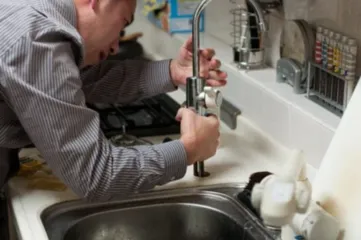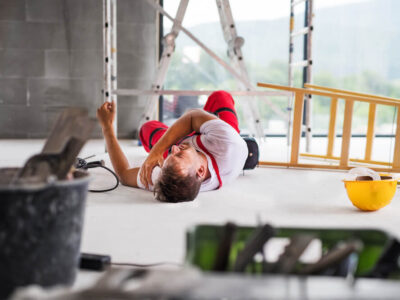Plumbers face numerous hazards while working on job sites in California. If you work as a plumber, you may be required to perform tasks in confined spaces or at heights, which could increase your risk of getting hurt. You may also be required to work in extremely hot or cold environments or in areas where asbestos is present. Take a closer look at some other common reasons plumbers may get hurt on the job.
Repetitive Motion Can Lead to Muscle or Soft Tissue Injuries
You may be required to push, pull, or haul heavy objects throughout your workday. Ideally, the home or commercial building where you work will minimize the strain on your body. Typically, repetitive motion causes pain in the neck, back, and shoulders, but you may also experience pain in your legs, wrists, or other parts of your body.
From a medical standpoint, these are known as musculoskeletal disorders (MSDs), which can include sprains, tendonitis, or carpal tunnel syndrome. Such injuries develop gradually over time and are among the most frequent reasons plumbers file workers’ compensation claims. OSHA and Cal/OSHA have identified repetitive stress injuries as a leading cause of lost workdays across construction trades.
Don’t Forget to Wear Your Safety Goggles
Exposure to bacteria and other airborne debris can result in temporary or permanent vision loss. Foreign objects may also come into contact with your eye, which might result in scratched retinas or other injuries. Wearing safety goggles can help protect this part of your body from preventable harm.
Beyond goggles, plumbers are often required to use other forms of Personal Protective Equipment (PPE)|. This includes gloves to prevent chemical burns, respirators to reduce the risk of inhaling asbestos or mold spores, and protective clothing to shield against sewage and other hazardous chemicals. OSHA’s hazard communication standards and Cal/OSHA safety orders require employers to provide this protective equipment and ensure that employees are properly trained in its use.
Mold Can Cause Serious Health Issues
Although mold may be difficult to detect in a home, you don’t want to be directly exposed to it for any length of time. Prolonged exposure to mold can lead to breathing and other long-term health issues. Generally speaking, mold can be found in bathrooms, behind walls, or in other areas of a home or building where plumbers frequently work.
Mold exposure has been linked to asthma, allergic reactions, chronic obstructive pulmonary disease (COPD), and long-term respiratory illness. In California, long-term exposure to environmental hazards such as mold, asbestos, or sewage can be classified as an occupational disease under the state workers’ compensation law. This means that illnesses do not have to result from a single accident; they may also arise from years of exposure to hazardous work conditions.
Additional Hazards Plumbers Face
While repetitive injuries, eye hazards, and mold are significant risks, plumbers also face a wide range of other dangers. Confined spaces such as crawl spaces and trenches expose workers to suffocation risks, toxic gas inhalation, and limited escape routes in emergencies. Extreme temperatures pose additional threats, with heat exhaustion and heatstroke being common in the summer months, while hypothermia and frostbite remain concerns in the winter.
Chemical hazards are also ever-present, as plumbers frequently handle solvents, adhesives, and cleaning agents that can cause severe skin irritation or occupational dermatitis. Asbestos, which is still found in many older California homes and commercial buildings, poses a long-term risk of mesothelioma and other forms of cancer if inhaled. Direct contact with sewage or wastewater may transmit bacteria, viruses, and parasitic infections that can cause serious gastrointestinal or skin conditions.
According to the Centers for Disease Control and Prevention (CDC) and the National Institute for Occupational Safety and Health (NIOSH), plumbing is classified as a high-risk construction trade, with injury rates comparable to those of electricians, roofers, and HVAC technicians.
Employer Responsibilities Under California Law
Employers are not only expected to provide safe workplaces—they are legally obligated to do so under the California Labor Code and enforced by Cal/OSHA. This includes:
- Providing and maintaining protective equipment such as respirators and goggles.
- Conducting exposure assessments for asbestos, mold, or chemical hazards.
- Offering training on lockout/tagout procedures, hazard communication, and confined space entry.
- Ensuring proper ventilation and decontamination protocols are in place.
When these obligations are not met and workers are injured, employers can be cited by Cal/OSHA, and the injured plumber may still pursue workers’ compensation benefits.
Workers’ Compensation and Legal Rights for Plumbers
Suppose you are hurt or get sick while on the job, you may be entitled to workers’ compensation benefits. This may make it easier to pay for current or long-term medical bills related to a workplace injury or illness. You may also be entitled to a portion of any wages lost while recovering from a workplace accident.
California workers’ compensation benefits may include:
- Medical Coverage: All reasonable and necessary treatment for workplace injuries and illnesses, including hospital bills, physical therapy, and prescription medication.
- Temporary Disability Benefits: Partial wage replacement while you recover and cannot work.
- Permanent Disability Benefits: Compensation if your injury results in a long-term or permanent impairment.
- Vocational Rehabilitation: Support to retrain or reenter the workforce if you cannot return to plumbing duties.
- Medical Mileage Reimbursement: Coverage for travel expenses to and from medical appointments.
- Death Benefits: Financial support for dependents if a workplace injury or illness proves fatal.
It is essential to act promptly, as workplace injuries must be reported within 30 days, and a workers’ compensation claim typically must be filed within one year. If a claim is denied, the case may proceed before the Workers’ Compensation Appeals Board (WCAB). Having legal representation can make the difference between a denied claim and a successful outcome.
Return-to-Work Considerations
Plumbers recovering from injuries may face long recovery timelines. California law encourages employers to provide modified duty or alternative positions when possible, allowing injured workers to return to the workforce gradually. Light-duty assignments can reduce wage loss while accommodating medical restrictions. If such positions are not available, vocational rehabilitation benefits may help injured plumbers transition into new roles outside the trade.
FAQs
What are the most common workers’ compensation claims filed by plumbers?
Musculoskeletal disorders, eye injuries, respiratory illnesses, asbestos-related diseases, and chemical burns are among the most common claims.
Can plumbers receive workers’ comp for asbestos or mold exposure?
Yes. Prolonged exposure to asbestos or toxic mold can qualify as an occupational disease under California workers’ compensation law.
What safety equipment should plumbers always use?
In addition to safety goggles, plumbers should use gloves, protective clothing, and respirators when necessary. For confined space work, ventilation and compliance with OSHA confined space entry standards are essential.
What should I do immediately after a plumbing injury?
Seek medical treatment right away, report the injury to your employer within 30 days, and file a workers’ compensation claim. Documenting the incident and following deadlines is critical.
What happens if my employer denies my workers’ comp claim?
If your claim is denied, you have the right to challenge the decision through the Workers’ Compensation Appeals Board. An attorney can guide you through this process.
Can I sue a third party if defective equipment caused my injury?
Yes. While workers’ compensation bars lawsuits against employers, third parties such as equipment manufacturers can still be held liable for defective tools or unsafe products.
Get Legal Help Today
If you are a plumber who has suffered a workplace injury or illness, you don’t have to navigate the process alone. The experienced workers’ compensation attorneys at Hussain & Gutierrez can help you secure the benefits you deserve, whether your claim involves repetitive stress, asbestos exposure, or a serious jobsite accident.
Contact Hussain & Gutierrez today for a consultation and let us safeguard your rights while you focus on your recovery.



